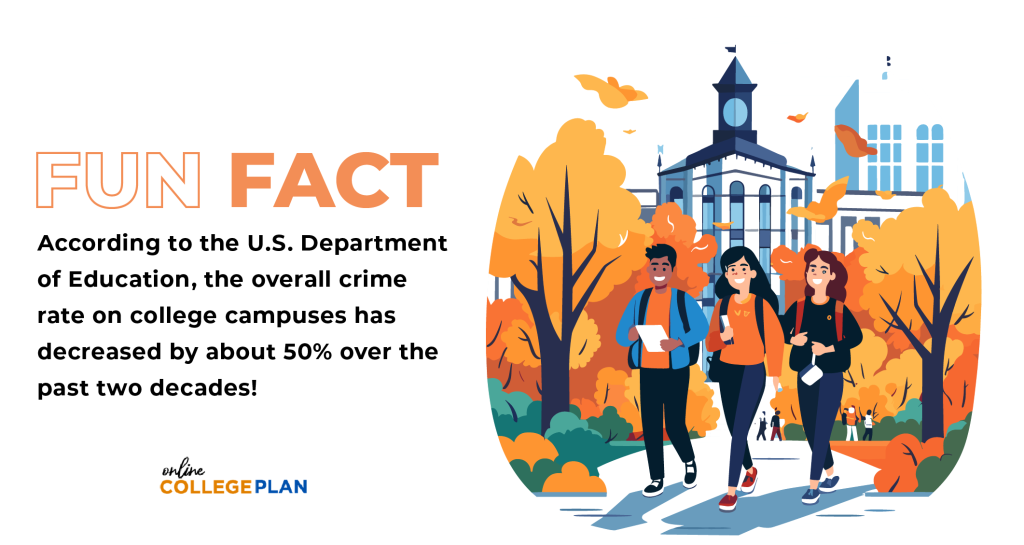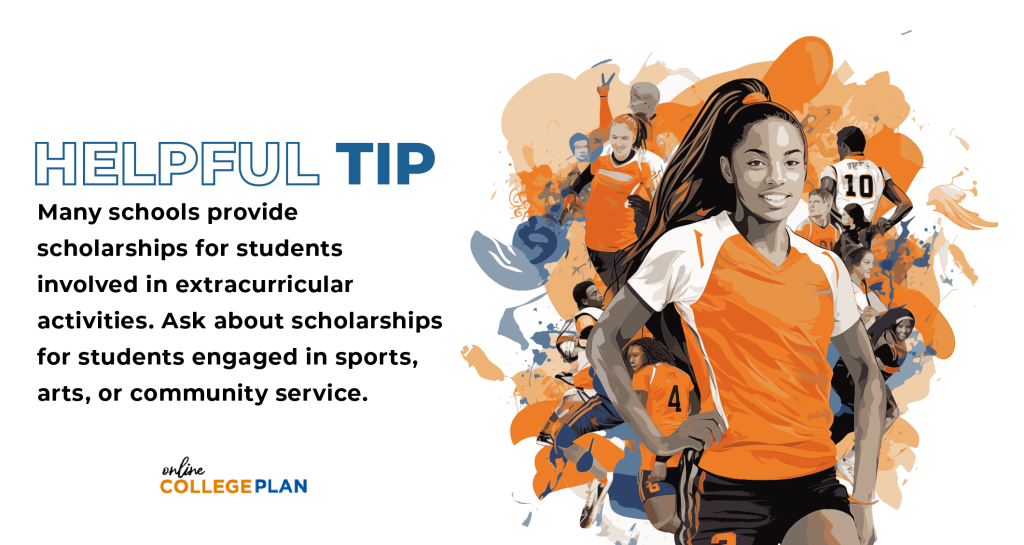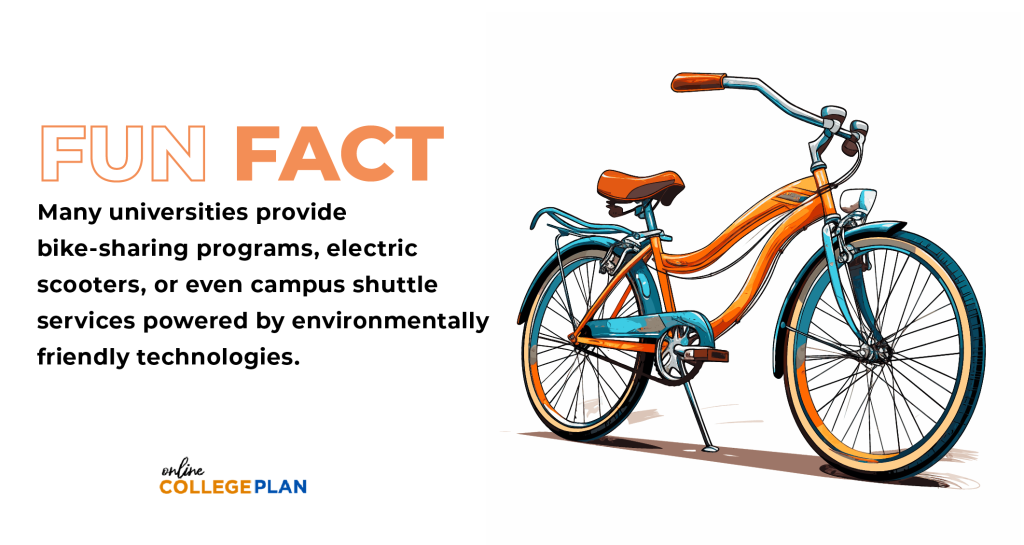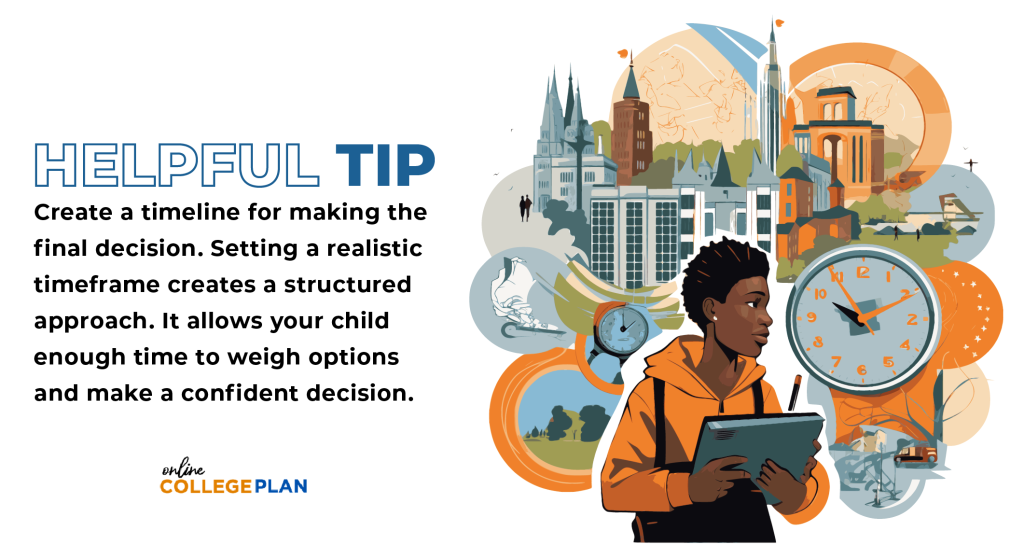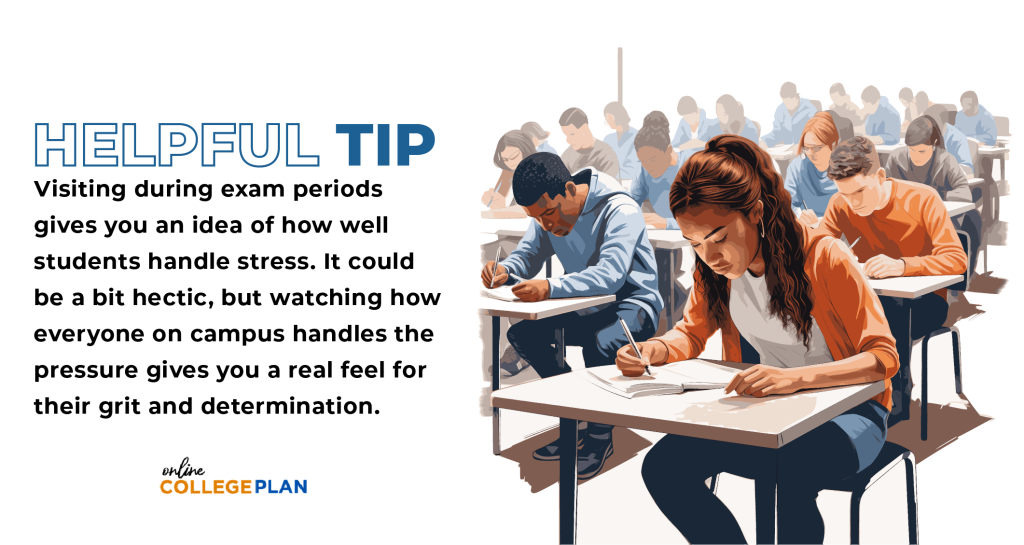Find your degree
Going on college tours with your high school student is exciting! It is a pivotal step on their higher education journey. As parents, you play a crucial role. You support and guide your child through this process. We created this parent’s guide to college tours to highlight some of the most important aspects of this experience. These college tour tips for parents can help in maximizing your college visit.
Understanding Campus Safety Measures
Visiting campus is more than exploring academic programs. It’s also an opportunity to assess the safety measures in place. You need to understand how the college prioritizes the safety of their students. This can bring peace of mind to both parents and students. You will want to know about campus security, as well as emergency response procedures.
- Campus Security: Begin by exploring the security infrastructure on campus. Make sure security personnel are visible and entrances and exits are monitored. This contributes to the physical safety of the campus.
- Emergency Response Procedures: Ask the college about their emergency response procedures. Ask about natural disasters and security threats. Understanding how the college handles emergencies is crucial. It boosts your confidence in their ability to protect and support students.
- Safety Features in Campus Facilities: Take note of safety features within academic buildings. Also, check dormitories and recreational facilities. For example, well-lit pathways, emergency call boxes, and surveillance cameras contribute to a secure environment.
- Student Education on Safety: Ask about programs addressing personal safety. You may also be interested in programs addressing alcohol and drug awareness. Are there programs addressing sexual assault prevention? Schools that prioritize these topics show an investment in a safer campus community.
- Safety Records and Statistics: Knowledge is power! You can review safety and security-related data for each school by visiting Campus Safety and Security (ed.gov). This tool allows you to view the last three years of data. You can even compare up to four schools side by side!
Understanding the safety measures on campus can help students feel secure. Thoroughly investigate these aspects during college tours. You want to be sure your child’s education takes place in a secure and supportive setting.
Discussing Financial Aid Options
College education often comes with financial considerations. During campus tours, it’s essential to learn about available financial aid options. You will also need to know the overall cost of attendance. Discussing financial planning early in the process can help your child make informed decisions about their academic future.
- Understanding Tuition and Fees: Begin by gaining a clear understanding of the college’s tuition and fees. Ask for a breakdown of costs. This includes tuition and room and board. You will also want to know how much to budget for books and miscellaneous fees.
- Available Scholarships and Grants: Ask about the scholarships and grants offered by the college. You will also want to ask about eligibility criteria and the application process. Be sure and make note of deadlines. Many institutions provide merit-based and need-based scholarships. These scholarships offer opportunities to save you quite a bit of money!
- Federal and State Financial Aid Programs: Discuss the federal and state financial aid programs available to students. You will need to understand the Free Application for Federal Student Aid (FAFSA) process and deadlines. Explore potential eligibility for Pell Grants. Consider Stafford Loans and other federally funded programs.
- Loan Options and Repayment Plans: Understand the types of student loans available and the associated terms. Discuss repayment plans and interest rates. Sometimes setting up autopay can reduce the interest rate! It’s essential to know the long-term financial implications of loans.
- Financial Aid Office Resources: Visit the financial aid office during your tour. If you have questions or concerns, this would be a good time to talk with a financial aid advisor. They can provide insights into specific financial aid packages. They can also offer advice on maximizing aid eligibility.
Discussing financial aid options during college tours is important. Parents and students need to understand the different ways to fund the college experience.
Exploring Nearby Amenities and Services
While in town on your visit, you should visit the surrounding community. Checking out nearby restaurants and fun activities. This can help you and your child understand what life will be like during their time at college.
- Housing Options: Start by checking out the housing around the area. Are there cool and safe off-campus places for students that won’t break the bank? Knowing about the local housing scene gives you the lowdown on living options other than those on campus.
- Dining and Grocery Options: Explore the dining and grocery options in the vicinity. Are there diverse and affordable restaurants, cafes, or grocery stores that meet your child’s needs?
- Recreational and Entertainment Venues: Check out the fun stuff around! Are there parks, theaters, or cool places where students can hang out and do fun things? A lively local scene makes college more fun, giving chances for kicking back and personal growth.
- Healthcare Facilities: If your child gets sick at college, are there healthcare facilities in the area? Are there any reputable hospitals, clinics, or medical centers nearby? Being close to quality healthcare means students can easily get the help they need when they’re not feeling well.
- Transportation: Do you plan on your child having access to a vehicle at school? Will they need to use public transportation? Are there bus or train services that connect the college to other parts of the city or region? What about Uber? It’s important to have reliable transportation options. This way, your child can get from point A to point B safely.
- Job and Internship Opportunities: Check out the job and internship opportunities available in the nearby area. Do any industries or companies work with the college to give students hands-on experience? Being close to job opportunities can help prepare students for their careers.
When you think about these things on college visits, you make sure that your child’s time off-campus matches what they like and makes them feel good overall.
Encouraging Open Communication with Your Child
College tours are more than gathering information. They’re also an opportunity for open communication between you and your high school student. Encouraging your child to express their thoughts and concerns during these visits. Thees discussions support shared decision-making. Your child will feel empowered to choose the school that best fits their needs.
- Understanding Expectations: Begin by discussing expectations openly. What does your child envision in their college experience? Understanding their aspirations, fears, and hopes provides valuable insights. This can guide your discussions during college tours.
- Addressing Concerns and Anxieties: College tours may stir up some anxiety. Your student may be insecure about the transition to independence. Create a space where your child feels comfortable expressing their worries. By addressing concerns openly, you can provide reassurance. You can also give practical advice to ease any apprehensions.
- Aligning Priorities: Talk about priorities and values. What aspects of college life are most important to your child? Is your child passionate about playing a sport in college? Are they determined to get a 4.0 GPA? What about joining a sorority or fraternity? You want to make sure you help your child choose a school that aligns with their priorities.
- Discussing Academic and Career Goals: Explore your child’s academic and career goals openly. What majors or fields are they interested in? How do they see their career path unfolding? Understanding these aspirations helps in selecting colleges that offer the right academic programs and support for their goals.
- Financial Considerations: Financial discussions can be sensitive but are crucial. Talk openly about the family’s financial situation and expectations. Discuss the role each party will play in covering college costs. Students need to have a realistic understanding of the financial situation.
Encouraging open communication during college tours builds a foundation of trust and understanding between parents and students. It turns the college exploration journey into a shared experience.
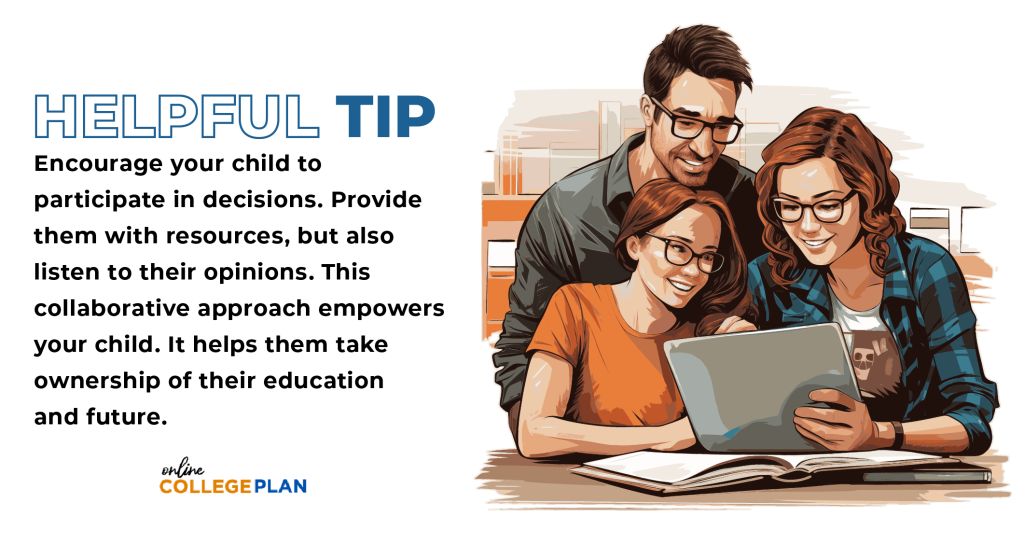
Planning Follow-Up Discussions After the Visit
After the excitement of the campus tour settles, it is crucial to plan follow-up discussions with your child. Reflect on the experience and address any lingering questions. Discuss the pros and cons of each campus. This can aid in the decision-making process.
- Reflections and Impressions: Give your child time to reflect on the college visit. What things stood out to them? Talking about these impressions helps them figure out what things matter most.
- Addressing Unanswered Questions: College tours can raise new questions or uncertainties. Create an open space for your child. Encourage them to voice any concerns or questions that came up during the visit. Addressing these questions provides clarity and peace of mind.
- Comparing Pros and Cons: Assist your child in comparing the pros and cons of each college visited. You can weigh the strengths and weaknesses of each school by creating a side-by-side comparison. This will help you make a more informed decision.
- Considering Practicalities: Discuss practical considerations such as location, climate, and campus size. These factors play a role in the overall college experience. They should align with your child’s preferences and lifestyle.
- Emphasizing Gut Feelings: Encourage your child to trust their instincts and gut feelings. Sometimes, factors like the overall atmosphere or a sense of belonging can play a crucial role in the decision-making process.
Having these chats after the visits turns the whole college hunting experience into a thoughtful decision-making adventure. When you talk it out with your child, you’re part of a team, supporting them to pick a college that matches their goals and dreams.
Timing of the Tours
The timing of college tours can significantly impact the overall experience. Understanding the pros and cons of different timing options can help you plan visits that align with your child’s schedule. It can also help you maximize the information you gather. This applies whether it’s during the academic year, weekends, or special visitation events.
- Academic Sessions and Campus Vibe: Visiting during the academic year provides a more authentic feel for campus life. You’ll see students hurrying between classes. They’ll also chat and join campus events. This firsthand experience helps gauge the campus vibe and academic energy.
- Special Events and Open Houses: Keep an eye on special events or open houses hosted by the colleges. These events can give you an idea of the campus culture, academic offerings, and extracurricular activities. Attending these events allows for a more immersive experience.
- Weekdays vs. Weekends: Consider touring on both weekdays and weekends. Weekdays showcase the regular rhythm of academic life. Weekends might reveal a more relaxed atmosphere with potential glimpses into student rec activities.
- Availability of Professors and Advisors: You may want to visit with professors and academic advisors during the tour. If possible, arrange meetings with faculty members relevant to your child’s intended major. These meetings give you an idea of the academic support available.
- Summer Break Considerations: While summer might offer flexibility, the campus might be less active. Consider this when evaluating the atmosphere. There won’t be as many students and staff on campus.
Choosing the right timing for college tours ensures a well-rounded understanding of the institution. By strategically planning visits during various periods, you gain a nuanced perspective, helping you make a more informed decision that aligns with your child’s preferences and goals.
Frequently Asked Questions
Yes, many parents join their kids on college tours. They offer support, ask questions, and share thoughts during the decision-making process. Having parents around helps address concerns and ensures everyone can provide valuable input.
Most students begin touring colleges around age 16 or 17, typically during junior year of high school. Some students will start exploring in sophomore year for a more extended process.
You should tour colleges that align with your preferences and academic goals. Consider factors like location and size. Keep logistics in mind, such as distance and cost. You want to aim for a mix of reach, match, and safety schools for a well-rounded perspective.
Tours are an important part of the college search process. While not mandatory, they provide a unique perspective beyond online research. Tours aid in making informed decisions and envisioning yourself on campus.
You can make a good impression on a college tour by being engaged, dressing appropriately, and asking thoughtful questions. Don’t be afraid to express gratitude and follow up with a thank-you email. Making a positive impression demonstrates your serious consideration of the college and leaves a lasting, favorable impression on admissions representatives.

